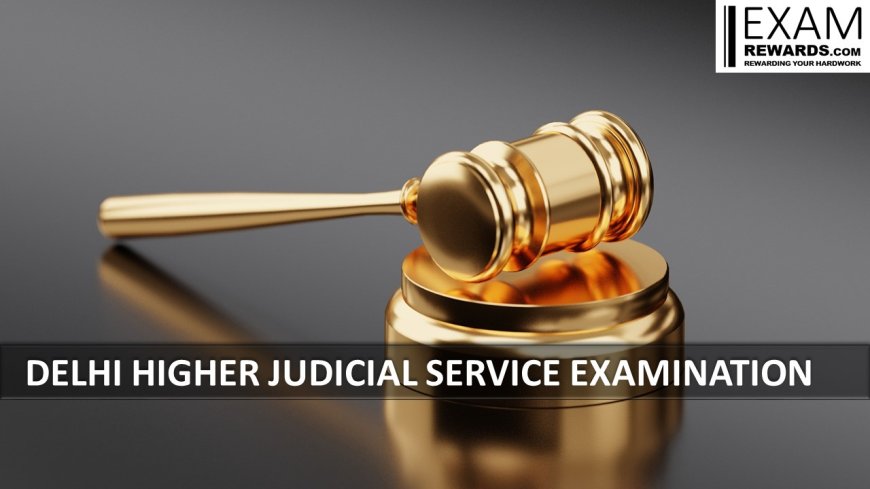DELHI HIGHER JUDICIAL SERVICE EXAMINATION
Video Lectures Notes Mock Tests
TABLE OF CONTENT
1. OVERVIEW
2. ABOUT EXAM
3. NUMBER OF VACANCIES
4. ELIGIBILITY
5. HOW TO FILL EXAM FORM
6. ALL IMPORTANT LINKS
7. SYLLABUS
8. SELECTION PROCESS
OVERVIEW
|
Exam name |
Delhi high judicial service Examination-2023 |
|
Number of vacancies |
16 (15 existing & 1 anticipated) |
|
Education qualification |
Must have been continuously practicing as an Advocate for not less than seven years as on the last date of receipt of applications, i.e., 29.07.2023 |
|
Age limit |
must have attained the age of 35 years and have not attained the age of 45 years on the 1st day of January of the year in which the applications for appointment are invited, i.e., on 01.01.2023. |
|
Registration date |
14.07.2023 at 1000 hours |
|
Last date of registration |
29.07.2023 at 1730 hours |
|
Mode of application |
Online |
|
Mode of exam |
Preliminary Examination (Objective type), Mains Examination (Written) and Viva-Voce shall be purely provisional. |
|
Application fees |
The fees (non-refundable) in the sum of Rs.2000/- for General Category candidates and Rs.500/- for reserved category [Scheduled Caste / Scheduled Tribe / Person with Disabilities (identified disabilities) of 40% or more] candidates should be paid through Debit Card//Credit Card/Internet Banking/UPI. |
|
Total number of vacancies |
16 |
|
Exam Date |
20 AUGUST 2023 |
|
|
|
ABOUT EXAM:-
Delhi High Court Are Invited Online Application Form For Higher Judicial Service Examination 2023. Interested Candidate Completed All Eligibility Criteria And Apply Online Application Form. Before You Apply Online Application Form Please Read Full Notification.
Application Fee:-
· General : 2000/-
· SC / ST / PH : 500/-
· Pay the Examination Fee Through Debit Card, Credit Card, Net Banking Fee Mode Only
Vacancy Detail –The category wise break up of vacancies to be filled is as under:-
|
Post name |
Category |
|
Eligibility |
||||
|
Delhi judicial service exam 2023 |
General |
SC |
ST |
Total |
|
||
|
03 |
07 |
06 |
16 |
Bachelor degree in law with 7 year advocate practice. |
|||
Applicable to the candidates are given in the Instructions available on the online portal, link for which would be available on the website of High Court of Delhi i.e. www.delhihighcourt.nic.in.
Job location- Delhi
Eligibility-
The qualifications for direct recruits shall be as follows:-
(1) must be a citizen of India.
(2) must have been continuously practising as an Advocate for not less than seven years as on the last date of receipt of applications, i.e., 29.07.2023.
(3) must have attained the age of 35 years and have not attained the age of 45 years on the 1st day of January of the year in which the applications for appointment are invited, i.e., on 01.01.2023.
HOW TO FILL EXAM FORM
· Delhi High Court Latest Job Recruitment for Higher Judicial Service Recruitment 2023 Batch Vacancies.
· Candidate Can Apply Between 14/07/2023 to 29/07/2023 Apply Online.
· upload scanned copies of photo, signature, identity proof and other document as per the required format and size mentioned in the instruction
· Fill the details as required.
· Kindly Check and Collect the All Document - Eligibility, ID Proof, Address Details, Basic Details.
· Kindly Ready Scan Document Related to Recruitment Form - Photo, Sign, ID Proof.
· Pay the application fees
· Take A Print Out of Final Submitted Form.
Prelims exam pattern
The prelims examination is qualifying nature.
Negative marking of 0.25 is applicable for every wrong answers.
THE EXAM PROCESS WILL CONSIST OF:-
|
PAPER 1 |
NO.OF QUESTION |
MARKS |
TIME DURATION |
|
General knowledge |
150 |
150 |
2 hours (120min) |
|
Current affairs |
|||
|
Questions relating to Laws and Acts |
|||
|
English language |
Selection process-
· Prelims
· Mains
· Viva-voce
Prelims exam syllabus
- Current Affairs
- General Knowledge
- English Language
- The Constitution of India
- The Indian Evidence Act, 1872
- The Limitation Act, 1963
- The Code of Civil Procedure, 1908
- The Code of Criminal Procedure, 1973
- The Indian Penal Code, 1860
- The Indian Contract Act, 1872
- The Indian Partnership Act, 1932
- The Arbitration and Conciliation Act, 1996
- The Specific Relief Act, 1963
- The Transfer of Property Act, 1882
- The Sale of Goods Act, 1930
- The Negotiable Instruments Act, 1881
- The Indian Succession Act, 1925
- The Hindu Succession Act, 1956
- The Prevention of Corruption Act, 1988
- The Protection of Children from Sexual Offences Act (POSCO Act), 2012
- The Recovery of Debts and Bankruptcy Act (DRT Act), 1993
- The Securitisation and Reconstruction of Financial Assets and Enforcement of Security Interest Act (SARFAESI Act), 2002
- The Motor Vehicles Act, 1988
- The Industrial Disputes Act, 1947
- The Payment of Wages Act, 1936
- The Employee’s Compensation Act, 1923
- The Minimum Wages Act, 1948
- The Factories Act, 1948
- The Payment of Gratuity Act, 1972
- The Juvenile Justice (Care and Protection of Children) Act, 2015
- The Commercial Courts Act, 2015
- The Provident Funds Act, 1925
- The Information Technology Act (IT Act), 2000
- The Trade Marks Act, 1999
- The Copyright Act, 1957
- The Patents Act, 1970
- The Designs Act, 2000
Mains exam & syllabus
|
Section |
Marks |
Time duration |
|
General knowledge |
150 |
2 Hours |
|
Law-I |
200 |
3 Hours |
|
Law-II |
200 |
3 Hours |
|
Law-III |
200 |
3Hours |
|
Total |
750 |
|
Syllabus
General knowledge & langauge
- Knowledge of Current Affairs
- Power of Expression in English
Law-I
· The Constitution of India
· The Code of Civil Procedure, 1908
· The Indian Evidence Act, 1872
· The Limitation Act, 1963
· The Registration Act, 1908
· The Commercial Courts Act, 2015
· The Court Fees Act, 1870
· The Trade Marks Act, 1999
· The Copyright Act, 1957
· The Patents Act, 1970
· The Designs Act, 2000
Law-II
- The Transfer of Property Act, 1882
- The Indian Contract Act, 1872
- The Sale of Goods Act, 1930
- The Indian Partnership Act, 1932
- The Specific Relief Act, 1963
- The Arbitration and Conciliation Act, 1996
- The Indian Succession Act, 1925
- The Hindu Marriage Act, 1955
- The Special Marriage Act, 1954
- The Hindu Adoptions and Maintenance Act, 1956
- The Guardians and Wards Act, 1890
- The Muslim Women (Protection of Rights in Marriage) Act, 2019
- The Muslim Women (Protection of Rights in Divorce) Act, 1986
- The Divorce Act, 1869
- The Recovery of Debts and Bankruptcy Act (DRT Act), 1993
- The Securitisation and Reconstruction of Financial Assets and Enforcement of Security Interest Act (SARFAESI Act), 2002
- The Motor Vehicles Act, 1988
- The Industrial Disputes Act, 1947
- The Payment of Wages Act, 1936
- The Employee’s Compensation Act, 1923
- The Minimum Wages Act, 1948
- The Factories Act, 1948
Law-III
- The Indian Penal Code, 1860
- The Code of Criminal Procedure, 1973
- The Indian Evidence Act, 1872
- The Prevention of Corruption Act, 1988
- The Protection of Children from Sexual Offences Act (POSCO Act), 2012
- The Juvenile Justice (Care and Protection of Children) Act, 2015
- The Information Technology Act (IT Act), 2000
- The Negotiable Instruments Act, 1881
- The Prevention of Money-Laundering Act, 2002
- The Protection of Women from Domestic Violence Act, 2005
- The Dowry Prohibition Act, 1961
Viva voce
The viva voce is the final round of the selection process and usually for account for 250 marks. Candidates who appear in the mains exam and qualify. Those who are selected for viva voce shall be required to produce a “NO OBJECTION CERTIFICATE” from the employer at the time of viva-voce.
If on verification at any time before or after the Preliminary Examination (Objective Type), Mains Examination (Written) and Viva-Voce, it is found that they do not fulfill any of the eligibility conditions, their candidature for the examination shall stand cancelled without any notice or further reference.












